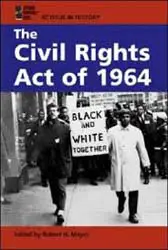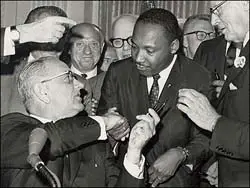Civil Rights Act of 1964
The years leading up to the 1960’s were filled with unrest, violence and unhappiness as the Black Americans faces continual discrimination in almost all aspects of their lives.
The Civil Rights Movement brought attention to their situation and in all parts of the country, people began to realize the unfairness that existed in the treatment of Black Americans. The March on Washington was a peaceful demonstration that finalized the meaning of freedom and opportunity. In 1964, the Civil Rights Act was passed to try to end segregation for the Black American.


Up until 1964, a variety of places in the country, mostly in the southern states had complete segregation between black and white citizens. This extended to bathrooms, restaurants, public transportation, hotels and even to the point of people working together.
Local laws called “Jim Crow Laws” in the south took things even further, allowing the direct attack and killing of Black Americans without due process of law as well as local rules that kept Black Americans from being able to vote. The Civil Rights Act of 1964 banned discrimination of employment based on race, color, religion, sex or national origin. It also banned discrimination involving any public place.

This act was originally proposed by President John F. Kennedy and, at the time of the first discussion, was completely opposed by those that lived in the Southern United States, and therefore it was opposed by their representatives in Congress.
After the assassination of President Kennedy, President Lyndon B. Johnson continued to move the act forward, even though there were many that were against it. There was a great amount of arguing in Congress as members of the Southern states repeatedly tried to keep the act from being approved.


The passing of the act created the Equal Opportunity Employment Commission that would oversee that the laws were upheld in employment and hiring. It became against the law to allow any Federal money to be used if there were situations of discrimination.
This opened the door to allow schools, who received Federal funding, to have segregated classrooms. This was of great importance in the south, where many of the ‘Black Only’ schools were poorly supported. It removed the “Jim Crow Laws” that kept Black Americans away from the voting polls and was hailed by Dr. Martin Luther King, Jr as a ‘second emancipation’.

The Civil Rights Act of 1964 was the beginning of the final expansion of freedoms for many people. In the years to follow, the Voting Rights Act of 1965 was passed, which removed any of the previous requirements set in place by local governments requiring literacy tests to be passed before being allowed to vote.
Additional laws that were passed, thanks to the Civil Rights Act of 1964 included The Fair Housing Act of 1968 which stated that discrimination of any kind in the purchase or renting of a home or any living area was against the law.

The Civil Rights Act of 1964 became the turning point in American history for Black Americans but also led to the fair treatment of other minorities and women. It removed Federal dollars from any organization or company that promoted discrimination and that led to changes that are felt to this day.




